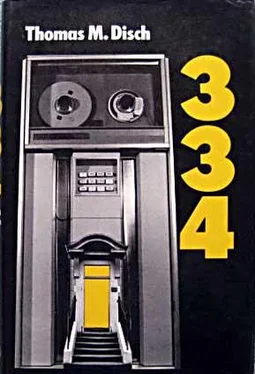“Make a wish,” Mickey said.
She made her wish, then with one decisive gust, blew out all twelve candles.
Shrimp winked at her. “Now don’t tell anyone what it was or you won’t get it.”
She hadn’t, in fact, been wishing for the Lowen School, since that was hers by right. What she’d wished instead was for Lottie to die.
Wishes never come true the way you think. A month later her father was dead. Juan, who’d never been unhappy a day in his life, had committed suicide.
Weeks after the Anderson debacle, when he’d last been able to assure himself that there’d be no dire consequences, Mrs. Miller summoned him uptown for “a little talk.” Though in the long-range view a nobody (her position scarcely brought her to middle management level), Mrs. Miller would soon be writing up his field summary, which made her, for now, a rather godlike nobody.
He panicked disgracefully. All morning he couldn’t think of anything but what to wear, what to wear? He settled on a maroon Perry Como-type sweater with a forest green scarf peeking out. Wholesome, not sexy, but not pointedly not-sexy.
He had a twenty-minute wait outside the lady’s cubbyhole. Usually he excelled at waiting. Cafeterias, toilets, launderettes—his life was rich in opportunities to acquire that skill. But he was so certain he was about to be axed that by the end of the twenty minutes he was on the brink of acting out his favorite crisis fantasy: I will get up, I will walk out the door. Every door. With never a word of good-bye nor a look backward. And then? Ah, there was the rub. Once he was out the door, where could he go that his identity, the whole immense dossier of his life, wouldn’t trail after him like a tin can tied to his tail? So he waited, and then the interview was over, and Mrs. Miller was shaking his hand and saying something bland and anecdotal about Brown, whose book had been decorating his lap. Then, thank you, and thank you for coming in. Good-bye, Mrs. Miller. Good-bye, Len.
What had been the point? She hadn’t mentioned Anderson except to say in passing that of course the poor man ought to be in Bellevue and that a few like that are statistically inevitable for anyone. It was better than he’d expected and more than he deserved.
Instead of the axe there was only his new assignment: Hanson, Nora/ Apartment 1812/ 334 E. 11th St. Mrs. Miller said she was a nice old lady—“if a little difficult at times.” But all the cases he was put on this year were nice and old and difficult, since he was studying, in the catalogue’s words, “Problems of Aging.” The one odd thing about this Hanson was that she had a sizable brood under her wings (though not as large as the printout had indicated; the son was married now) and would not seem to be dangerously lonely. However, according to Mrs. Miller, her son’s marriage had “unsettled her” (ominous word!) which was why she stood in need of his warmth and attention four hours a week. A stitch in time seemed to be what Mrs. Miller had in mind.
The more he thought about it the more this Hanson woman sounded like an impending disaster. Mrs. Miller had probably called him in to cover herself, so that if and when this one went in the same wrong direction Anderson had gone, it would be his fault, not the nice old difficult lady’s, and not absolutely Alexa Miller’s. She was probably doing her memorandum for the file right now, if she hadn’t done it in advance.
All this for two miserable dollars an hour. Sweet fucking Jesus, if he’d known four years ago what he’d be getting into, he’d never have switched his major from English. Better to teach assholes to read the want ads than be an emotional nursemaid to senile psychotics.
That was the dark side. There was also a bright side. By the fall semester he’d have cleared up his field requirements. Then two years of smooth academic sailing, and then, O happy day, Leonard Rude would be a Doctor of Philosophy, which we all know is the next best condition to out-and-out freedom.
The MODICUM office had sent round an apologetic, shaggy boy with bad skin and a whining midwestern accent. She couldn’t get him to explain why he’d been sent to visit her. He claimed it was a mystery just as much to him, some bureaucrat’s brainstorm, there was never any sense to these projects but he hoped she’d go along with it for his sake. A job is a job is a job, and this job in addition was for his degree. He was going to the university?
Yes, but not, he assured her at once, that he’d come here to study her. Students were assigned to these make-work projects because there wasn’t enough real work to go around. That was the welfare state for you. He hoped they’d be friends.
Mrs. Hanson couldn’t bring herself to feel unfriendly, but what she asked him quite bluntly were they supposed to do, as friends? Len—she kept forgetting his name and he kept reminding her it was Len—suggested that he read a book to her.
“Aloud?”
“Yes, why not? It’s one I have to read this term anyhow. It’s a super book.”
“Oh, I’m sure it is,” she said, alarmed again. “I’m sure I’d learn all kinds of things. But still.” She turned her head sideways and read the golden title of a fat, black book he’d laid down on the kitchen table. Something OLOGY.
“Even so.”
Len laughed. “Fiddle-dee-dee, Mrs. Hanson, not that one! I can’t read that one myself.”
The book they were to read was a novel he’d been assigned in an English class. He took it out of his pocket. The cover showed a pregnant woman sitting naked on the lap of a man in a blue suit.
“What a strange cover,” she said, by way of compliment.
Len took this for another sign of reluctance. He insisted that the story would seem quite commonplace once she accepted the author’s basic premise. A love story. That’s all. She was bound to like it. Everyone did. “It’s a super book,” he said again.
She could see he meant to read it, so she led him into the living room and settled herself in one corner of the sofa and Len in the other. She found the Oralines in her purse. As there were only three left, she didn’t offer one to him. She began sucking complaisantly. Then, as a humorous afterthought she fit a premium button over the end of the stick. It said, I DON’T BELIEVE IT! But Len took no notice or else he didn’t get the joke.
He started reading and right from page one it was sex. That in itself wouldn’t have upset her. She had always believed in sex and enjoyed it and though she did think that having sex ought to be a private matter there was certainly no harm in a candid discussion. What was embarrassing was that the whole scene took place on a sofa that was wobbling because one leg was missing. The sofa that she and Len were sitting on also had a missing leg and wobbled, and it seemed to Mrs. Hanson that some sort of comparison couldn’t be avoided.
The sofa scene dragged on and on. Then nothing at all happened for a few pages, talk and descriptions. Why, she kept wondering, would the government want to pay college students to come to people’s homes and read pornography to them? Wasn’t the whole point of college to keep as many young people as possible occupied and out of jobs?
But perhaps this was an experiment. An experiment in adult education! When she thought about it, no other explanation fit the facts half so well. Viewed in this light the book suddenly became a challenge to her and she tried to pay closer attention. Someone had died, and the woman the story was about—her name was Linda—was going to inherit a fortune. Mrs. Hanson had gone to school with someone called Linda, a dull-witted Negro girl whose father owned two grocery stores. She’d disliked the name ever since. Len stopped reading.
Читать дальше












